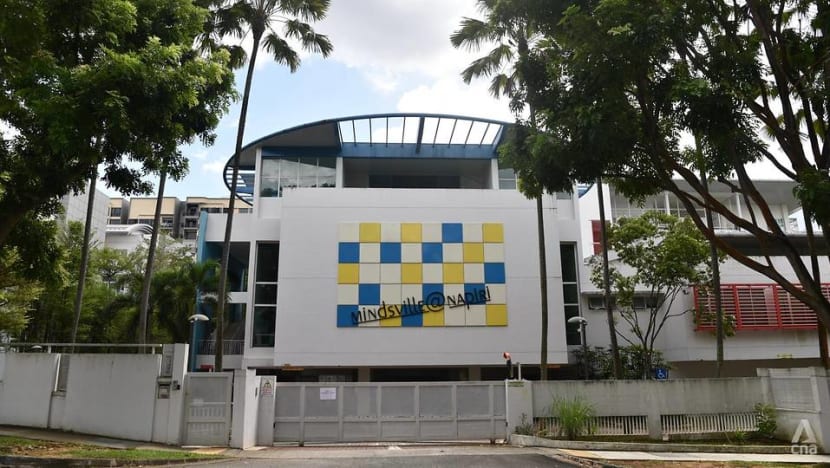MOH reviewing COVID-19 processes to be more inclusive of people with special needs

A view of MINDSville@Napiri, located at 7 Lorong Napiri, on Jun 3, 2021. (Photo: Jeremy Long)
SINGAPORE: The Ministry of Health (MOH) is reviewing its COVID-19 processes and arrangements to be more inclusive of people with special needs, Parliamentary Secretary for Health Rahayu Mahzam said on Wednesday (Jun 9).
The ministry is also looking into engaging people who are trained to work with those with special needs, she said in a Facebook post at midnight.
“My colleagues at MOH will work to improve on our processes,” she said.
Her post came a day after a family member of a person with special needs wrote on Facebook the issues her brother faced during the swab and quarantine process.
WHAT HAPPENED
Ms Amylia Koh had detailed her experience after her brother, who has an intellectual disability and relies on his family to care for him, was issued a quarantine order.
READ: COVID-19 cluster at MINDSville@Napiri: Why is it so hard to keep the virus out of adult care homes?
He is a client at MINDSville@Napiri, which is currently an open cluster. As of Tuesday, 33 people from the home for people with intellectual and developmental disabilities were diagnosed with COVID-19.
Ms Koh, who said that she was writing the post as a “frustrated caregiver”, wrote that after a request for quarantine at home was declined, she made arrangements with MOH to care for her brother during his stay at a government quarantine facility.
“My brother would be out of his routine, in an unfamiliar setting, away from our parents. People with special needs thrive on routine and might engage in maladaptive behaviours due to change,” she said.
However, she initially had issues accompanying him.
“Not only was the team unprepared to manage QO (quarantine order) cases of persons with special needs, but also demonstrated a severe lack of compassion and understanding when caregivers tried to enlighten them on the disability and their needs,” she said.
She also raised her concerns about the swabbing process.
“To describe the swabbing experience as horrifying would be to undermine what my brother was put through,” she said.
She added that although she was his caregiver and “the person who was most equipped to handle my brother and his needs, I was instructed to watch from a distance”.
READ: Students in COVID-19 quarantine facilities are allowed to have caregivers: MOH
“All the swabbers took turns trying to swab my brother, who became increasingly frustrated and was on the brink of an aggressive meltdown,” she said.
Half an hour later, "they finally heeded my suggestion and allowed me to step in and assist them", she said.
She also said she had enquired on the possibility of using alternative testing methods such as a new breathalyzer test that has received provisional authorisation by the Health Sciences Authority.
ENGAGING EXPERIENCED PEOPLE TO WORK WITH PEOPLE WITH SPECIAL NEEDS
In response to Ms Koh's post, Ms Rahayu said that MOH has heard her feedback and will improve communications between various agencies involved in managing the quarantine process.
"We understand their grievance and it is indeed unfortunate that they had to go through such an experience," she said.
"We recognise that the swab process and the quarantine can be more challenging for persons with special needs as they may not be comfortable with unfamiliar people or environment."
Ms Rahayu, who has a child with special needs, said that these tests need to be done by people who are trained to ensure accurate results, but that these professionals have not been specially trained to deal with people with special needs.
"We are looking into engaging relevant professionals, as well as volunteers from the National Council of Social Service, who are trained to work with persons with special needs," she said.
She said that the ministry will also look into the various feedback received, including studying the effectiveness of deploying alternative COVID-19 tests while balancing the considerations for speed, comfort and accuracy of the test.
"We will also improve communications between the various agencies involved in managing the quarantine process," she added.
She noted that quarantine of close contacts is carried out for effective containment of cases to limit the spread of the COVID-19 virus in the community.
"We accommodate requests for an accompanying caregiver for persons under quarantine (PUQ) with an extenuating circumstance," she said referring to people who may be elderly, minors or those who have a medical condition and are unable to look after themselves.
"We have reminded Certis, our agent for quarantine orders, to be mindful and exercise compassion when dealing with persons with special needs," she said.
She added that those who man the operations on the ground, work very hard to manage various cases.
They do their best and often have to keep learning and keep improving so that they can make processes better for all, she said.
"COVID-19 has tested all of us and we have to keep finding the best way to suppress this pandemic, as we continue to be compassionate and considerate to one another," she said.
BOOKMARK THIS: Our comprehensive coverage of the COVID-19 pandemic and its developments
Download our app or subscribe to our Telegram channel for the latest updates on the coronavirus outbreak: https://cna.asia/telegram














